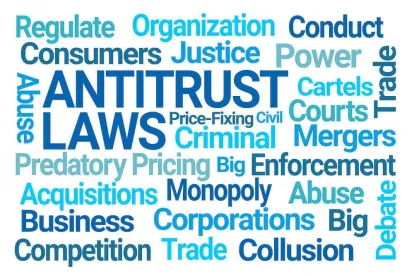United States
A. Federal Trade Commission (FTC)
-
Consent decree for Stryker Corp. to divest assets as part of $4 billion acquisition of Wright Medical Group N.V.
On Nov. 3, 2020, the FTC announced that it would require Stryker Corp. and Wright Medical Group N.V. to divest assets related to Stryker’s total ankle replacements and finger joint implant products to remedy antitrust concerns that Stryker’s proposed $4 billion acquisition of Wright would harm competition in those markets. The FTC consent decree requires the divestiture of those assets to DJO Global, Inc., permitting it to become an independent, viable, and effective competitor to Stryker. The proposed consent decree also requires Stryker to supply DJO Global with transition assistance and to act as an intermediary supplier until DJO Global obtains FDA approval to be the legal manufacturer of the divested products
2. FTC files administrative complaint to block CoStar Group’s acquisition of competitor, RentPath.
On Nov. 30, 2020, the FTC filed an administrative complaint and authorized a federal court suit to block CoStar Group Inc.’s $575 million proposed acquisition of competitor RentPath Holdings, Inc. CoStar and RentPath both operate a number of websites matching prospective renters with available apartments. The complaint alleges that the proposed acquisition would significantly increase concentration in the already highly concentrated markets for internet listing services advertising for large apartment complexes in 49 U.S. metropolitan areas. The complaint alleges that CoStar and RentPath are one another’s closest competitors by vying to sell internet listing services to property management companies and to attract prospective renters to use their listing services, and that each has targeted the other with sales campaigns and significant discounts to win and retain advertising customers.
B. Department of Justice (DOJ)
-
DOJ files suit to block Visa’s acquisition of Plaid, Inc.
On Nov. 5, 2020, the DOJ filed a civil antitrust suit to stop Visa Inc.’s proposed $5.3 billion acquisition of Plaid Inc. The DOJ complaint alleges that Visa is a monopolist in online debit services and that Plaid, which is a successful fintech firm, is developing a nascent payments platform that would challenge Visa’s monopoly. The complaint alleges that Plaid, which is the leading financial data aggregation company in the United States, was developing a disruptive lower-cost option for online debit payments that would allow consumers to pay merchants directly from their bank accounts using bank credentials rather than a debit card. The complaint further alleges that Visa was making the proposed acquisition of Plaid as an “insurance policy” in order to reduce the threat of increased competition that would undermine Visa’s U.S. debit business and force Visa to accept lower margins for its merchant services.
2. President of Chicago-area flooring company pleads guilty in bid-rigging conspiracy.
On Nov. 18, 2020, DOJ announced that the president and principal owner of a Chicago-area flooring company had pleaded guilty for his role in a conspiracy to rig bids and fix prices for commercial flooring services and products sold in the United States. According to the plea agreement filed in court, from at least 2009 through June 2017 the defendant engaged in a conspiracy to suppress and eliminate competition in the commercial flooring market by agreeing with competitors to submit complementary bids so the designated company would win the bid. The defendant’s guilty plea is the sixth such plea in the DOJ investigation (See September 2020 Competition Currents for more information).
3. DOJ files suit against National Association for Realtors.
On Nov. 19, 2020, DOJ filed a civil lawsuit against the National Association of Realtors (NAR) alleging that it had established and enforced illegal restraints on the ways that it competes, along with a proposed settlement that requires NAR to repeal and modify its rules to remedy those practices. The proposed changes will provide greater transparency to home buyers about the commissions charged by buyers’ brokers; require brokers to cease misrepresenting that buyers’ brokers are free; eliminate rules that prohibit filtering multiple listing services based on the amount of buyer broker commissions; and change its rules which limit access to lockboxes to only NAR-affiliated real estate brokers. The DOJ alleges that the effect of the NAR practices has been to decrease price and services competition among real estate brokers.
4. DOJ requires Intuit to divest as part of Intuit’s acquisition of Credit Karma.
On Nov. 25, 2020, DOJ announced that it would require Intuit Inc., the creator of TurboTax, and Credit Karma Inc. to divest Credit Karma’s tax business to Square Inc. as a condition to permitting Intuit to proceed with its $7.1 billion acquisition of Credit Karma. DOJ said that without the required divestiture, the proposed transaction would substantially lessen competition for “digital do-it-yourself” tax preparation products, which are software programs used by American taxpayers to prepare and file their federal and state tax returns. Intuit’s TurboTax is the largest supplier of such products in the United States, and Credit Karma is the fifth-largest provider of such services. The complaint alleges that Intuit’s TurboTax has a dominant position in the market for such tax preparation products, that Credit Karma Tax has become a disruptive competitor with a significant competitive impact in the market since entering four years ago, and that Credit Karma’s “always-free” business model enables Credit Karma to compete aggressively for filers who pay for TurboTax, thereby constraining TurboTax prices and forcing Intuit to improve its TurboTax offerings. Under the terms of the proposed settlement the parties must divest to Square, Inc. the assets that comprise Credit Karma Tax, including all relevant software and intellectual property, agree to Square’s hiring certain key Credit Karma employees that support Credit Karma Tax, and provide certain transition support services to Square while Square integrates Credit Karma Tax into its Cash App platform.
C. U.S. Litigation
1. In re Rotavirus Vaccines Antitrust Litigation, No. 18-cv-1734, 2020 WL 6828123 (E.D. Pa. Nov. 20, 2020).
Three pediatric medical practices can proceed with a proposed class action accusing Merck & Co, Inc. of illegally stifling competition to its rotavirus vaccine RotaTeq after a judge rejected the drug maker's bid to send the case to arbitration. Putative class plaintiffs were all members of PBGs, which allow doctors' offices to join together and obtain group pricing discounts for vaccines from a manufacturer. Merck had argued that, to the extent the PBGs signed contracts with it on behalf of themselves and their members, then any medical practices that bought vaccines through the PBGs were subject to those agreements' arbitration clauses. Judge Joyner said that while the contracts contained clauses reflecting Merck's desire to impose the agreements' terms on individual practices, Merck could not establish that the PBGs had the authority to enter into arbitration agreements on their behalf.
The District Court stated that Merck needed to be able to show that the PBGs were acting as the medical practices' agents in order to argue that they were bound by the terms of the arbitration clauses since they had not themselves signed the contracts. "Based upon all of the foregoing, the Court simply cannot find that sufficient grounds exist to compel the Plaintiffs to arbitrate their anti-trust claims in this case," Judge Joyner wrote.
From 2006 to 2008, Merck's RotaTeq was the sole rotavirus vaccine available in the United States. In 2008, the U.S. Food and Drug Administration approved GlaxoSmithKline's vaccine, Rotarix. According to the lawsuit, which was filed in April, Merck responded to GSK's entry into the market by adding a condition to its contracts that required customers to buy rotavirus vaccines from it or face price penalties on its other vaccines. According to the putative class plaintiffs, the provision meant that any customer who wanted to buy Rotarix from GSK had to be willing to pay substantially more to purchase other pediatric vaccines from Merck, including those for which it was the sole supplier.
The lawsuit alleged that Merck's conduct violated the federal antitrust laws and caused medical practices to pay artificially inflated prices for rotavirus vaccines.
2. In re Local TV Advertising Antitrust Lit., MDL No. 2867, 2020 WL 6557665 (N.D. Ill. Nov. 6, 2020)
Several media companies face a price-fixing class action lawsuit alleging that they conspired to raise TV advertisement prices in violation of antitrust laws. Plaintiffs allege that during the Class Period, Defendants secretly orchestrated a unitary scheme to supra-competitively raise the prices of broadcast television spot advertisements by agreeing to fix prices and exchange sales data, including pacing data. Broadcaster defendants first sought to dismiss the complaint on the grounds that it did not contain an adequate allegation of an antitrust injury, and that Plaintiffs accordingly lack standing to sue. Plaintiffs claim that Defendants’ collusion and price-fixing scheme allowed the Broadcaster Defendants to avoid price competition, harming direct purchasers of broadcast television spot advertising in DMAs throughout the United States. Plaintiffs allege that a number of plus connect Defendants to an antitrust conspiracy. Plaintiffs also rely on evidence of the settlements and consent decrees stemming from a 2018 DOJ investigation into the same or similar conduct against these defendants. According to the court, a DOJ investigation alone is not enough to support an inference of antitrust conspiracy, but the allegations here are that the investigations produced results, namely consent decrees and settlements. The plus factors that Plaintiffs allege include: an information exchange of competitively sensitive information, a motive to conspire, actions and conduct that would be against the Broadcaster Defendants’ unilateral self-interest in the absence of an anticompetitive agreement, opportunities to collude through trade associations and otherwise, high market concentration, and high barriers to entry. According to the court, Plaintiffs’ alleged explanation for increased prices in the face of declining demand—that Defendants exchanged sensitive information—satisfies the plausibility standard.
3. Pac. Steel Grp. v. Commercial Metals Co., No. 4:20-cv-07683, (N.D. Cal. Nov. 23, 2020).
San Diego-based rebar fabricator and installer Pacific Steel Group (PSG) seeks damages and injunctive relief in a suit alleging federal antitrust and California business practices law violations by Commercial Metals Co. (CMC), Irving, Texas, and its principal plant builder, Danieli Corp., Cranberry Township, Pa. The suit details the efficiency of vertical integration in rebar production, fabrication, and installation, especially in light of micro mill technology from Danieli, which has built low-cost production lines for market-leading CMC in Texas and Oklahoma. Pacific Steel Group (PSG) alleges that Commercial Metals Company (CMC) conspired with Danieli Corporation to prevent PSG from building a Danieli micro mill to begin manufacturing its own rebar. PSG further alleges that CMC has priced its fabrication and installation services below cost for the purpose of injuring PSG and destroying competition in violation of two California statutes. The suit was filed in U.S. District Court for the Northern District of California, naming as defendants CMC and two subsidiaries, plus Danieli.
Mexico
A. COFECE announces retail industry antitrust probe.
The Federal Economic Competition Commission (COFECE or Commission) has announced an abuse of a dominant position investigation in the retail sale of consumer goods and related services. Recently, the Commission published a Market Study on Competition in the Retail Industry, focusing on food and beverages. In that study COFECE indicated that big retail companies forced terms and conditions on their suppliers (such as delaying payments or applying discounts), creating uncertainty for small suppliers and transferring to them the risk of unsold products. According to COFECE, the probe aims to ascertain if there are dominant players in the retail market committing “relative monopolistic practices,” the official term to describe an abuse of a dominant position in Mexico.
In this case, COFECE’s main line of investigation is the existence of an abuse of a dominant position related to:
| i. | The imposition of the price or other conditions that a distributor or supplier must observe when providing, marketing, or distributing goods or services; and/or |
|
| ii. | The action of one or more Economic Agents whose object or effect, direct or indirect, is to increase costs or hinder the production process or reduce the demand faced by one or more other Economic Agents. |
COFECE emphasizes that this investigation is not a prejudgment on the responsibility of any economic agent; to date, violations of the economic competition regulation have not been identified definitively, nor have the subject or subjects who would be considered responsible for the violations. The timeframe for this investigation is up to 120 working days, starting July 24, 2020, and can be extended for the same period up to four times. If an abuse of a dominant position is proven, the responsible company could face a fine of up to 8% of their annual income and an order to stop the conduct.
B. COFECE issues an opinion on a proposal to regulate the commissions charged by pension funds.
COFECE has recommended not approving amendments to the Social Security Law and the Retirement Savings System Law, which established a limit on the fees charged by pension funds in Mexico. The initiative that was presented in the Chamber of Deputies establishes, among other changes, a cap on the fees charged by the pension funds administrators (Afores), so that these fees are not higher than the average of the fees charged in Chile, Colombia, and the United States.
According to the Commission, having indicators of other countries as a reference is a mechanism used in the design of regulation. However, there is a need to validate the comparability between savings systems in terms of different variables, such as the number of accounts and balances that are managed in each system, and the type of fees that can be charged in each country. In this case, the proposed amendments did not have a justification for the selection criteria of the referenced countries chosen. COFECE also found that the proposed criteria would create inflexibility to adapt the regulation as the market changes.
Instead, COFECE has asked for changes in the regulation that: (i) avoid establishing predefined limits and allow the modification of fees in accordance with the changes that occur in the market; (ii) elevate returns for workers; and (iii) foster competition through cost reduction.
Edoardo Gambaro, Yuji Ogiwara, Stephen M. Pepper, Gillian Sproul, Hans Urlus, Dawn (Dan) Zhang, Filip Drgas, Simon Harms, Marta Kownaca, Shuhei Mikiya, Pietro Missanelli, Jose Abel Rivera-Pedroza, Ippei Suzuki and Rebecca Tracy Rotem also contributed to this article.







 />i
/>i

